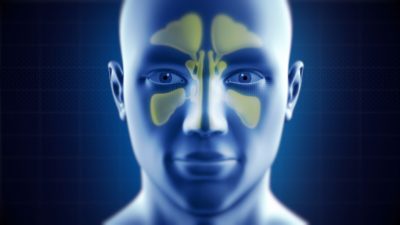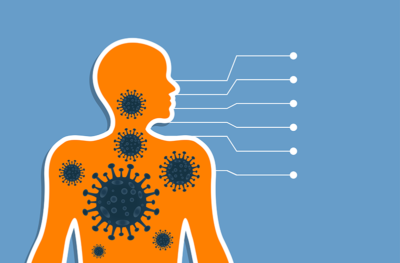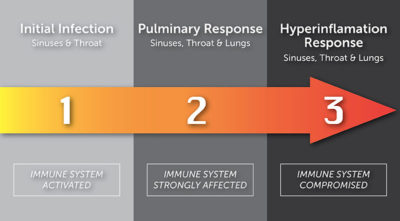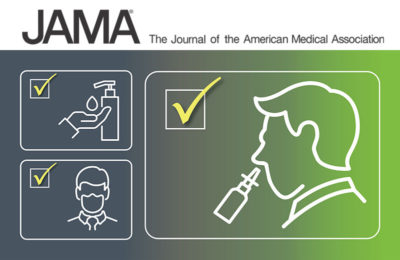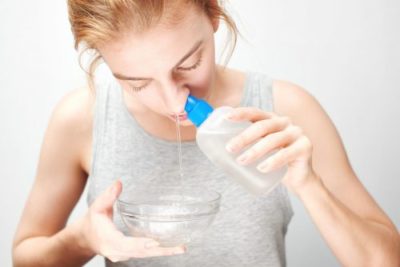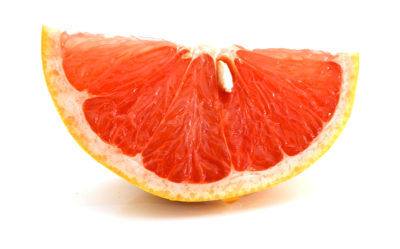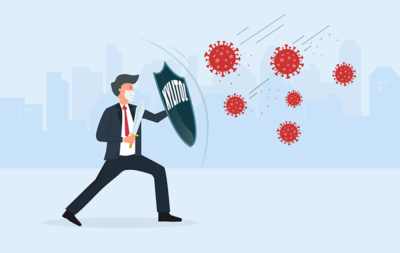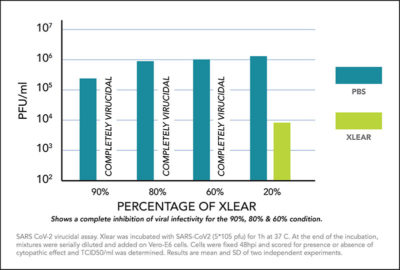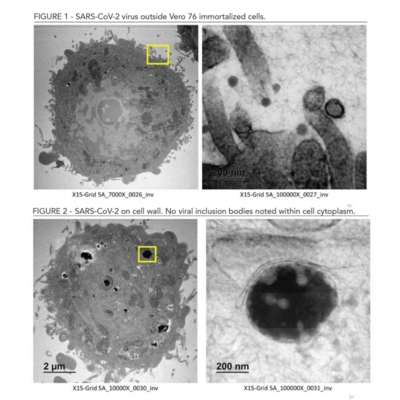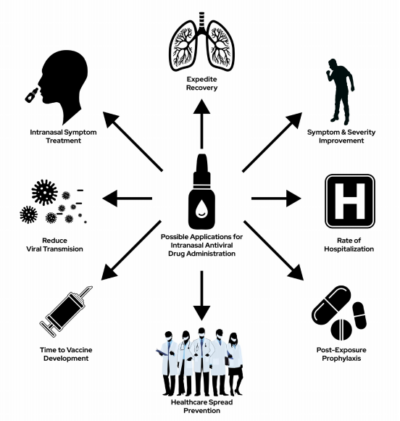VIRAL RESEARCH:
We believe in maintaining health through proactive transformational hygiene. Xlear’s xylitol-based products support that goal.
This is why Xlear Inc. has placed such an emphasis on doing viral research during the years of the pandemic. This research further built on the valuable legacy of all their research into xylitol’s effect on pathogenic bacteria and other microbial allergens and pollutants that affect nasal (and dental) health.
INTRODUCTION
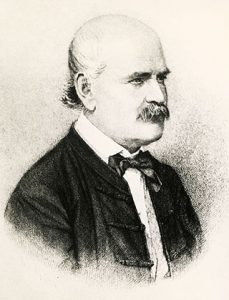
From the time that Ignaz Semmelweiss first wrote about the need for physicians to wash their hands between patients and the time that it became the standard of care (or mandated because it wasn’t being done) was 150 years. Semmelweiss was ridiculed, laughed at, and discredited, but history proved him correct.
Washing our hands and nose are simple hygienic ways that we can stop the spread of bacteria and viruses.Washing our hands helps stop the spread of infections, but only because you reduce the transmission of viruses or bacteria from your hands to your mouth, nose, or your eyes where they can easily enter the body. The nose is where most bacteria and viruses enter the body, and that’s precisely why nasal hygiene is so important!
Wouldn’t it make more sense to wash our nose with something that helps to block viral and bacterial adhesion?
Nearly 75% of the visits to primary care physicians in the U.S. are related to upper respiratory issues, and South Africa probably has similar statistics. We can bring that number down significantly by taking primary nasal hygiene more seriously.
Even if and when we’ve been vaccinated, we are still able to transmit the virus, and scientists aren’t certain whether we’re fully protected against newer strains. It makes sense then, in addition to hand-washing and sanitising, that we should add nasal hygiene to our defensive armoury.
Dr. Lisa Rohan, a professor at the University of Pittsburgh School of Pharmacy and Magee-Womens Research Institute & Foundation, has the following to say about a nasal spray in general: “We feel a nasal spray is perfect … to neutralize the virus before it gets into the lungs and causes a lot of clinical complications. One advantage it has over vaccines is its broad spectrum of activity against a number of different coronaviruses. The other benefit is for immunocompromised people, who aren’t successful with vaccines — so this is an alternative for them as well.”
Consider the following scientifically supported facts:
- 90 percent of the viral load that causes Covid 19 is found in the nose (New England Journal of Medicine)
- Two recent in-vitro studies have shown that Xlear Nasal Spray kills 99.7% of the SARS-CoV-2 virus (Utah State University, University of Geneva)
- Xylitol actually blocks the entry of the virus into our cells (University of Tennessee)
Xlear is effectively a natural virucidal and bactericidal nasal spray, making it an excellent preventive aid against not only Covid, but other viruses and bacteria too. So transform your nasal hygiene and make it more effective, by washing your nose with Xlear Nasal Spray.
For more information, please refer to the below viral research studies. These are arranged from oldest (top) to newest (bottom).
Anti-Adherence of Bacteria – 1998
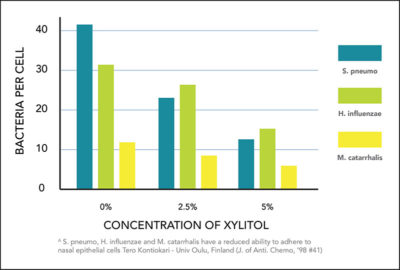
Xylitol Nasal Irrigation in the Management of Chronic Rhinosinusitis – 2011
In this pilot study, researchers wanted to find out if irrigating the sinuses with a water-xylitol solution would improve symptoms of people suffering from chronic rhinosinusitis. They concluded, “Xylitol irrigations result in greater improvement of symptoms of chronic rhinosinusitis as compared to saline irrigation.”
Airway Study – 2015
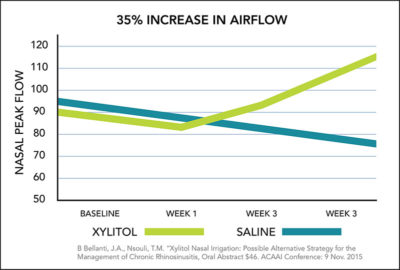
Improved Nasal Volume Utilising Hyperosmotic Saline Xylitol Mixture – 2019
(Effective Alternative or Adjunct to Decongestants and Antihistamines)

In this article Drs. Olmos and Baba discuss their findings which showed that 3 minutes after spraying participants’ noses with a saline and xylitol spray, they experienced a 20% improvement in airway volume.
High Viral Load in the Nose – Mar. 2020
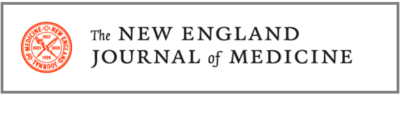 In this correspondence, researchers shared their research which showed that the nose has the highest viral load of SARS-CoV-2 than elsewhere in the body when infected with the virus.
In this correspondence, researchers shared their research which showed that the nose has the highest viral load of SARS-CoV-2 than elsewhere in the body when infected with the virus.
Zou, L., et al., (2020). SARS-CoV-2 Viral Load in Upper Respiratory Specimens of Infected Patients. The New England Journal of Medicine, 382(12), 1177–1179.
Mapping How SARS-CoV-2 Infects the Body – May, 2020
Benefits and Safety of Nasal Saline Irrigations in a Pandemic
(Washing SARS – CoV-2 Away – Jul. 2020)
In this paper, researchers discuss how cleaning the sinuses with a simple saline could be useful during the pandemic. They conclude saying that adding an anti-viral or virucidal agents to the saline could be beneficial against SARS-CoV-2.
Farrell NF, et al. (2020). Benefits and Safety of Nasal Saline Irrigations in a Pandemic—Washing COVID-19 Away. JAMA Otolaryngol Head Neck Surg., 146(9):787–788.
Anti-Adherence of SARS-CoV-2 Virus – Aug. 2020
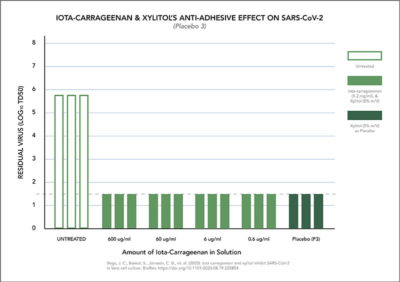
In a study looking at Iota-carrageenan’s effect on SARS-CoV-2, researchers found that xylitol also had an anti-adherence effect on the virus.
Vega, J. C., et al., (2020). Iota carrageenan and xylitol inhibit SARS-CoV-2 in Vero cell culture. BioRxiv.
Researchers concluded that using a nasal spray that deactivates the SARS-CoV-2 virus in the nose, “may not only prevent person-to-person spread of SARS-CoV-2, but may also diminish the severity of disease in patients by limiting spread and decreasing viral load delivered to the lungs.”
Frank, S., et al., (2020). In Vitro Efficacy of a Povidone-Iodine Nasal Antiseptic for Rapid Inactivation of SARS-CoV-2. JAMA Otolaryngology– Head & Neck Surgery.
In this interim analysis, researchers evaluated the effect irrigating the nose and sinuses had on reducing symptoms related to SARS-CoV-2. They found, “The effect of nasal irrigation on symptom resolution was substantial, with nasal congestion and headache resolving a median of 7 to 9 days earlier in the intervention groups”. Our analysis suggests that nasal irrigations may shorten symptom duration and may have potential as a widely available and inexpensive intervention to reduce disease burden among those affected.”
Deactivation of SARS-CoV-2 with Xlear Nasal Spray – Nov. 2020
In this paper, researchers look at two studies performed at Utah State University (2020) and University of Geneva (2020) which showed that Xlear Nasal Spray destroyed 99.99% of the SARS-CoV-2 virus.
Further Evidence of Xylitol’s Effectiveness Against SARS-CoV-2, H1N1, and Other Viruses – Jan. 2021
In this study researchers used an electron microscope to take pictures of xylitol’s and grapefruit seed extract’s (GSE) interaction with the SARS-CoV-2 virus. They concluded, “Combination therapy with GSE and xylitol may prevent spread of viral respiratory infections not just for SAR-CoV-2 but also for future H1N1 or other viral epidemics. GSE significantly reduces the viral load while xylitol prevents the virus attachment to the core protein on the cell wall.”
Cannon, M. L., et al., (2020). In Vitro Analysis of the Anti-viral Potential of nasal spray constituents against SARS-CoV-2. BioRxiv.
PAASE Bulletin 18: Use of Povidone-Iodine to reduce transmission of SARS-CoV2 virus – Jan. 2021
The Philippines has recognized the benefit of using anti-viral and virucidal nasal sprays as an adjunct therapy to mitigate the spread of the SARS-CoV-2 virus. Government officials now officially recommend the usage of these sprays to combat the virus.
In this review, researchers looked at all the studies talking about intranasal therapy in fighting against SARS-CoV-2. They concluded, “Based on the literature review, it is encouraging to note that studies reviewed note that using nasal spray with antiviral properties has promising efficiency and safety in the treatment and prophylaxis against SARS-CoV-2…We propose that intranasal administration of antiviral and virucidal therapies decrease the viral activity in the nasal pathway, thus preventing disease transmission, expedite recovery of patients, decrease severity of symptoms, reduce hospitalization, and mortality.”
Go, Camille Celeste, et al., (2021). Intranasal therapy and COVID-19: A comprehensive literature review. Journal of Allergy and Infectious Diseases. 2(1):9-16
Learn more about the SARS CoV2 virus from the below links and videos:
Xylitol nasal spray: An effective tool in COVID-19 prevention – Shirley Gutkowski, BSDH, RDH
Why breathing correctly is crucial to COVID 19 prevention – Timothy Ives, RDH, BSc (Hons), FHEA
Info you should know about COVID 19 – Common Sense Medicine
[/fusion_text][/fusion_builder_column][/fusion_builder_row][/fusion_builder_container]

